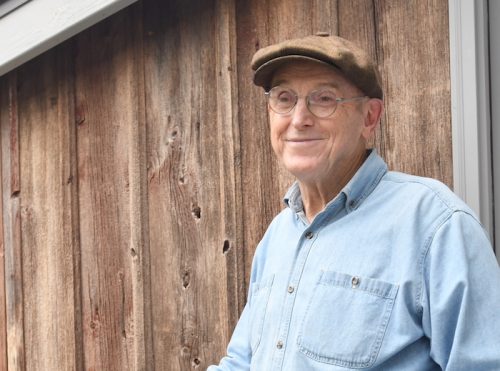More than 50 years ago, author Jerry Hansen served in Vietnam with the U.S. Army’s 101st Airborne Division. In his most recent collection of poetry, “The Kontum Madonna,” he revisits those experiences.
Q: You dedicated the book to a man named David Papesh. Tell us about him.

Four months after graduating from high school, Dave and I enlisted in the Army. It was 1965, dominos were falling in Southeast Asia, and we were both suffering all the ordinary symptoms of youth. Although Dave died in Vietnam, few of my memories have him in uniform. My memory of Dave with the most wear on it has him driving down St. Germain Street in St. Cloud in his robin-egg blue 1960 Chevy convertible with his girlfriend Diane beside him. Dave and I enlisted in the Buddy Program wherein the Army promised we would stay together throughout our time in the service. The Army did honor their promise until I sprained my ankle on my first parachute jump at Fort Benning. Although with different battalions, in time we were both assigned to the 101st Airborne Division. A soldier who was with Dave when he was wounded told me that his last memory was of Dave praying the Our Father as they loaded him onto the helicopter.
Q: You and your wife, Jeanette, worship at Sacred Heart Parish in Sauk Rapids. How do you bring a Catholic worldview or religious lens to your experience and your writing?
I can’t imagine a collection of war poems without any reference to faith. I can still recall in Vietnam how every firefight was followed with a silence seemingly shaped for prayer alone.

Given that Pope Julius II, Joan of Arc, Joyce Kilmer, Thomas Merton, Ammon Hennacy, Ben Salmon and Dorothy Day were all Catholics [with differing views about war], it is difficult to say what the Catholic view regarding war really is. I am told Dorothy Day, while speaking at the College of St. Benedict after World War II, was booed by Catholic GIs who had recently returned from the war.
In recent years, the Church has been moving away from the just war theory, although in 1965, it was still considered “settled” teaching. We went off unaware that Vietnam was different than the war that our fathers and uncles had gone off to, and that our war would forever be shrouded in controversy.
As to my writing, I have probably been influenced more by Kentucky farmer and author Wendell Berry than any other living writer. While Berry is not Catholic, his sense-tied views and pastoral voice seem to me what we are much in need of now.
Q: What is your hope for “The Kontum Madonna”?
 I think every soldier’s experience is unique. Even two soldiers going through the war side by side will experience it differently. One will come away unscarred and the other severely wounded.
I think every soldier’s experience is unique. Even two soldiers going through the war side by side will experience it differently. One will come away unscarred and the other severely wounded.
“The Kontum Madonna” is less about dying than it is about having killed. A soldier does not have to live with having died — he has to live with having killed. War is about playing God — about the taking away of another human being’s breath and then forever after keeping busy enough to forget that you did it.
Poetry is not an all-terrain vehicle — it is not designed to carry delusion or denial. The mission of a war poem is to tell the truth and not to add another layer to comfort. My poems were conceived in 2 a.m. darkness over five decades and say as well as I am able what Vietnam was for me. My hope for the book is that it will seep into the places where it is needed most and that over time it will move the needle slightly in the direction of peace.
Q: Why has it taken you so many years to write this book?
In my defense, I can only point to the stubborn pace of epiphany — that sometimes the poet has to live into the poem or, better put still, die into it.
Q: After returning from Vietnam, you spent seven years in Africa with Maryknoll. What lasting impact has it had on you?

I was working as an orderly at the St. Cloud Hospital when I came upon an article in The St. Cloud Visitor. “Farmers Wanted in East Africa” beckoned the headline in bold type. I sensed little that day of how much answering that ad would change my life. One hectic year later I had finished Swahili Language School and was living in a small village in Tanzania.
While difficult to explain, something mystical plays out at the intersection of poverty, struggle and hope — something that gets lost on the way to a dandelion-free lawn, stainless steel appliances and a granite countertop. To live among people two gunny sacks of maize removed from hunger is both a humbling and fertile experience. After 40 years I still wonder how it is I took so much away from a people who ostensibly had nothing to give.
LEARN MORE: “The Kontum Madonna: A Collection of Viet Nam War Poems” by J. Vincent Hansen. Drawings by Dick Adair. North Star Press of St. Cloud, Minnesota: 2021; 100 pp.; $15. It is available at most book stores, online and from the publisher. Hansen also is the author of “Blessed Are the Piecemakers,” “Without Dividend in Mind,” and “The Medicine of Place” and the multimedia play “The Wedding of Tomorrow and Sorrow.”






















